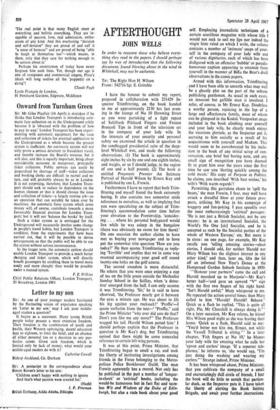Out of fashion
Sir I am grateful to Elizabeth Jennings for trying to do as much justice as she can to Charles Morgan (SPECTATOR. 7 April) and not to fall into hurried. prejudiced judgments.
But before choosing the title of her article, she should have pondered over these lines which Charles Morgan was writing to Miss E. M.
Aldemingen (Letters, page 205): '. I wonder whether you have read this morning an article on Olivia Manning in The Times Literary Supple- ment. . . . What is all this nonsense about cater- pillars and cocoons? And why, because Miss Manning is "in.- should Edith Sitwell be "out"? I simply do not understand this process of the ins and outs. One might as well say that Homer went out when Tolstoy came in! There is no end to the fashionable absurdity!'
To be ashamed of having liked Charles Mor- gan's novels when she was sixteen is to be ashamed of having ever been young and in love and to believe that such values as truth, beauty and love have no longer a right of existence in our materialistic world; to believe they are the con- temptible privilege of immature 'adolescents' is to miss altogether the spiritual function of true poetry, which is to 'unfreeze the imagination.' As Charles Morgan was also writing, 'The common mistake is to suppose that the newness whose call is so imperious is necessarily some addition from without. We seek feverishly for the new thing in the outside world. We spend ourselves 112 the pursuit of diversion and excitement But the lesson which the wise man has learned is that new- ness of life, like the newness of the spring world about him, is no extraneous treasure trove, but the outward token of an inner impulse which has "lent the veil of his old husk.— As for reproaching him with a lack of humour, let us again hear his own words in a letter to his French translator Mme Delamain (page 179): The real point is that many English sneer at everything and belittle everything. They are in- capable of passion, love, real admiration, enthu- siasm of any kind. And this everlasting "derision and self-derision" they are proud of and call it "a sense of humour" and are proud of being "able to laugh at themselves too"—which means, in them, only that they care for nothing enough to be serious about it'
Perhaps his countrymen of today have never forgiven him such lines. Yet, though our age is one of computers and commercial singers, Plato's ideals will long outlive all the `puppet(s) on a string'l 91 Penshurst Gardens, Edgware, Middlesex







































 Previous page
Previous page